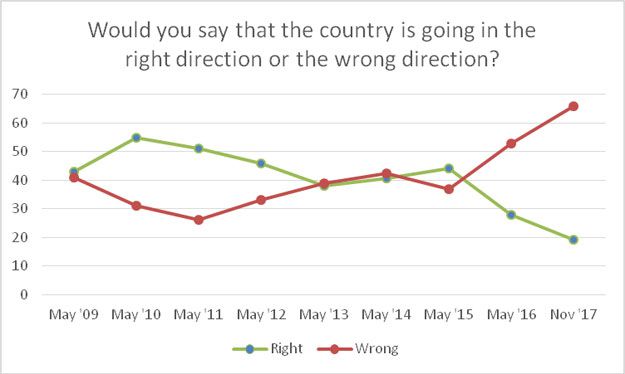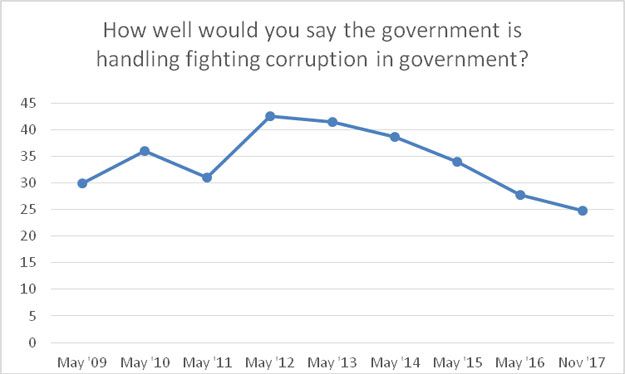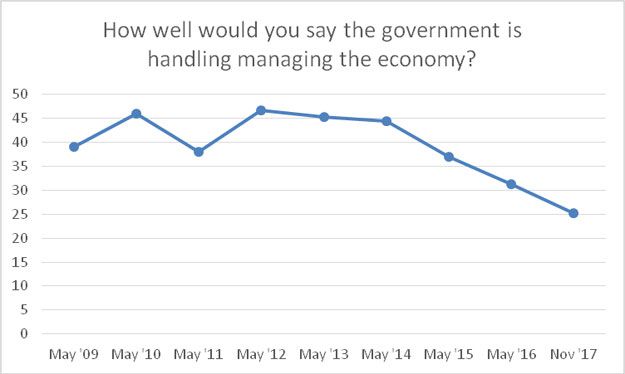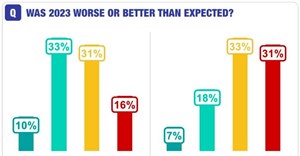
The decline of the Zuma years
When looking at the perceptions of South Africans over this period (measured form May 2009 to November 2017), there is a clear trend of declining optimism and dwindling appreciation of the work undertaken by government in different areas of delivery. From the graphs below, it is evident that the mood in the country in November last year was especially despondent. The Pulse of the People™ studies are carried twice a year on the Ipsos Khayabus project, interviewing a representative sample of at least 3,500 adult South Africans.
Would you say that the country is going in the right direction or the wrong direction?
From May 2009 until May 2012 roughly about half of South Africans were relatively optimistic about the future direction of the country and said that the country was going in the right direction. After about three years of flux, negative opinions started dominating and in November 2017 two thirds (66%) of adult South Africans believed the country was moving in the wrong direction.

How well do you think President Jacob Zuma is doing his job?
The ratings of how well President Zuma was doing his job have declined slowly since May 2010 where almost 70% of the population rated his performance favourably. The greatest decline occurred between May 2015 and May 2016 with the score decreasing by 15 percentage points. In November 2017 only one quarter of South Africans measured President Zuma as doing his job well or fairly well.

How well would you say the government is handling fighting corruption in government?
Since 2009 the government did not convince the people of South that they were serious about the fight against corruption and from a high of just more than four in every ten during 2012 and 2013 there has been a steady decline. At the end of 2017 only one quarter of South Africans said that the government was handling the fight against corruption in government either “very well” or “fairly well”.

How well would you say the government is managing the economy?
A lot of work has to be done to restore trust in the government’s ability to handle issues of national concern, as a similar downward trend is evident in the country’s perception as to how the government was handling the management of the economy. As can be seen on the graph below, there were two short periods of slightly higher optimism in 2010 and 2012. However, the overall performance of the government on this issue was also never rated above 50% - and the prevailing sentiment is negative with only one quarter rating the government’s performance positively.

1Technical detail:
Fieldwork for this study was conducted from 2 November to 7 December 2017. A total of 3,562 South Africans, 15 years and older, were interviewed. They were randomly selected and interviewed face-to-face in their homes and home languages. Interviews were conducted all over the country, from metropolitan areas to deep rural areas. This methodology ensured that the results are representative of the views of the universe and that findings can be weighted and projected to the universe – i.e. South Africans 15 years and older.
Trained quantitative fieldworkers from all population groups were responsible for the interviewing and CAPI (Computer-Assisted Personal Interviewing) was used. All results were collated and analysed in an aggregate format to protect the identity and confidentiality of respondents.
All sample surveys are subject to a margin of error, determined by sample size, sampling methodology and response rate. The sample error for this sample at a 95% confidence level is a maximum of 1.63%.
1In all cases the blue line shows the proportion of South Africans who evaluated the specific area of performance as “very good” or “fairly good”.
- Unlocking the value of creativity in advertising: How to bridge the creativity gap15 Apr 13:47
- 4 habits keeping your brand poor26 Mar 16:08
- Understanding consumer mindsets for growth in 202407 Mar 08:52
- South Africa's unemployment nightmare: The burden on its people09 May 10:05
- Global survey shows shrinking trust in internet29 Nov 10:17



















